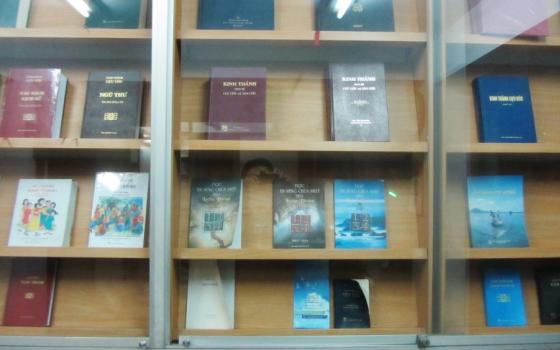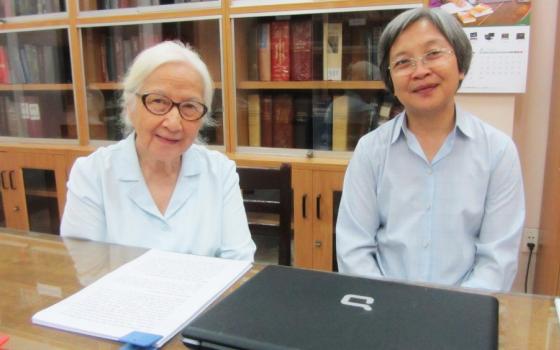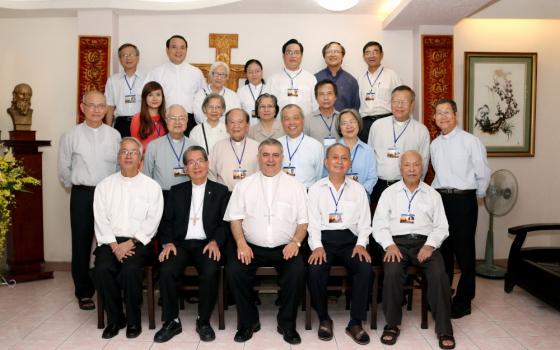After the Second Vatican Council (1962-1965) allowed local churches to celebrate liturgical services in their own languages, some Vietnamese priests and religious were eager to translate the Bible into Vietnamese versions that are suitable for their traditional culture.
Six priests voluntarily started to render the Latin Liturgy of the Hours into Vietnamese in late 1971. They later formed the Liturgy of the Hours Group that drew more priests and sisters who are expert in the Bible, theology, liturgy, pastoral ministry, sacred music, literature and poetry.
Franciscan Fr. Pascal Nguyen Ngoc Tinh, who manages the group's work, said at first group members spent only their Christmas, Easter and Tet (Lunar New Year) holidays working quietly at monasteries and convents. For decades, they overcame obstructions and difficulties made by communist authorities and even by church officials to pursue their mission in life.
This year marks the 45th anniversary of the group's establishment.
"We have finished Vietnamese translations of the Liturgy of the Hours, Roman Missal, Mass readings, books of rites and especially the Bible in Hebrew, Aramaic and Greek," he said. They also circulate Vietnamese translations of the Old Testament and New Testament with simple commentaries in various sizes for children, teenagers, adults and blind people, and Sunday readings for Lectio Divina.
They have published 370,000 Vietnamese copies of the Liturgy of the Hours, 66,000 copies of Mass readings and rites, and 3 million copies of the Bible. Products are available online for people to use, too.
"Our translations have been done by an independent collective including priests, religious and laity," said Fr. Tinh. In the past there were five Vietnamese translations of the Bible made by individuals.
The translations are widely known among Vietnam's Catholic population of 7 million and in Vietnamese communities abroad.
Tinh said sisters have made great contributions to these achievements.
Sisters committed to serving God's Word
Notre Dame Sr. Marie Amelie Nguyen Thi Sang, who has spent 41 years working with the group, said, "Our top priority is to provide Catholics with Vietnamese translations that have the same meaning as the original texts, are agreeable to Vietnamese people and are readily understandable so that people can receive God's Word." Good translations of the Bible help apply Christian values to Vietnamese cultures and traditions.
Sr. Sang said people from Vietnam's southern, central and northern regions have different customs, idiolects, dialects and expressions, so the group try to select the most commonly used words and expressions in translations.
She was the only woman and southern native working for the first 20 years among priests from northern and central regions. She said she chooses favorable words referring to women. "For example, I used the words các bà hộ sinh, polite words referring to midwives, instead of các bà đỡ đẻ, which are unkind words often used by northern people," she said.
"At first some priests did not accept words and expressions I suggested, but later they did," she said with a smile.
Thanks to her knowledge of Chinese, she enriches the local language with Catholic terms in Chinese-Vietnamese such as ngôn sứ (prophets), kinh sư (scribes) and hiển dung (the Transfiguration). In addition to her native language, she also speaks Chinese, English and French and understands biblical Latin, Greek and Hebrew.
The group now includes four sisters and 13 priests from various congregations, and two lay Catholics working at their own headquarters in Ho Chi Minh City. Each of them works from one to three days per week.
Regarding the group's solidarity and harmony, Sang said, "Although we are from various congregations, backgrounds and regions, we respect one another, treat one another with equal parity and accept differences among us to support one another." Group members are in their 40s to 80s.
They set a model of a participatory church in Vietnam where clericalism remains rampant. Laity and women religious are typically undervalued and required to obey clerics.
Since 1999 the group has been making a literal translation of the Bible with full commentaries into Vietnamese that aims to meet students' needs for biblical studies. They expect to publish the translation in 2021 when they mark their 50th anniversary.
Training younger generations in biblical studies
Sr. Mary Le Thi Thanh Nga, another Notre Dame nun who joined the group in 1995, said she was inspired to study the Bible by Sr. Sang. Then she taught herself the Old Testament, studied Bible commentaries and learned old languages and translation methods from other religious and priests.
Nga, who spent three years studying the Bible in Belgium, now teaches Hebrew, the Pentateuch and prophetic books at institutes for men and women religious. She also does Bible translation. It is her great passion for the Word of God that urges her to master the ancient Hebrew, she said, and she wants to convey it to younger religious.
"Now I am providing my students inspiration to study the Bible," the provincial superior of Notre Dame said. "I am happy that some young priests are working with the group."
Dominican Sr. Agnes Nguyen Thi Canh Tuyet, who teaches the Old Testament at the Major Seminary in Xuan Loc, started working with the group in 2007. She said she learns from senior colleagues, not only fraternity, knowledge, experience and working skills, but dedication to the church and homeland.
Sr. Tuyet said she also teaches the Bible to lay Catholics, giving them the pleasure of studying the Bible so that they can live out their faith, as God's Word is the ultimate end in life.
[Joachim Pham is a correspondent for National Catholic Reporter, based in Vietnam.]



